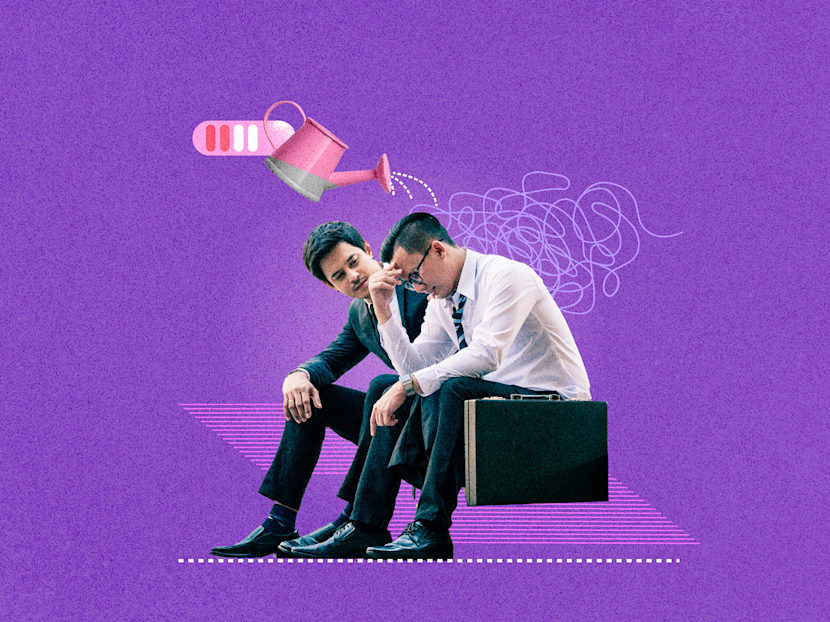Mental health in the workplace: The good, the bad and the sad
Being a boss sometimes feels like being a therapist. But handling mental health gripes demands discernment, says the author.

For many bosses and managers, workplaces taking a turn towards managing mental well-being has led to a heavier mental load. (Illustration: CNA/Samuel Woo, iStock)

This audio is generated by an AI tool.
When I started my own creative agency 10 years ago, I thought my job as chief executive officer would be simple: Win over clients with award-winning work, and everything else would fall into place.
The duly inspired staff would enjoy smooth camaraderie and banter, and we would sit around drinking fine whiskey, Mad Men-style, ruminating on our boundary-pushing genius.
What I didn't expect was how much time I'd spend playing a part-time therapist, listening to the outpouring of late-night stresses and emotions of my staff’s personal lives.
No whiskey, no glamour. Just the invisible work of holding everyone together.
In recent years, workplaces have taken a turn towards managing mental well-being.
Employees are no longer treated as replaceable cogs in a machine, but as people with emotions, struggles and complicated lives. We tell ourselves that the modern office should be more compassionate than the hard-nosed cubicle farms of decades past where "get it done" was the mantra.
But for many bosses and managers like myself, this shift has led to a heavier mental load.
Beyond key performance indicators (KPIs) and deadlines, we're now expected to pay mind to personal anxieties, professional frustrations and sometimes even deeper pains that don't always belong in the office.
"GRIPES GO UP, NOT DOWN"
"Gripes go up, not down." This iconic line from the 1998 Hollywood war epic Saving Private Ryan explains it all: Soldiers can complain to their sergeants, and sergeants to their captains, but never the other way around.
The chain of command means that the weight of holding it all together rests on those at the top.

That line captures something many leaders quietly live with. We absorb the complaints and the pain because that is part of the job. We steady the ship so others don't feel the roil of the waves.
I'll admit there were moments this year where I wanted to prematurely end a counselling session or two with three blunt words: Do your job.
Instead, I swallowed my impatience, listened harder, tried to decipher whether what I was hearing was stress, burnout, a symptom of a bigger systemic flaw in our business or organisation – or just one person simply having a bad week.
Because leadership isn't about being right all the time; it's about being the emotional ballast, even when you're fraying at the edges yourself.
TO CARE IS HUMAN
Still, the tension is always there: What happens when caring too much means the work doesn’t get done?
Too much empathy and you risk stasis through endless conversations with little progress. Too little, and you become the cold taskmaster, pushing people to keep going and delivering until they quietly burn out or leave.
Each situation demands discernment. Sometimes the right move is to push someone harder, to remind them that work is still work. Other times, the right call is to let a deadline slip because what your colleague needs most at the moment is just a little bit of space.
One of my staff members went through a particularly difficult time when her parent passed away. The loss of a close loved one is an incredibly challenging life event and I did what I could to offer a listening ear, as well as time off and practical support. The team also rallied together to ease her workload and took turns to check in on her.
There were other situations where it felt necessary to focus on keeping things professional in the workplace, and it was more prudent to encourage them that the work still needed to be done. I've had staff members who went through relationship breakups and it affected their productivity for months. At some point, the need for emotional support needed to be balanced by the need to still do our job.
The trickiest thing about this balance? Most of us were never trained for it. We became managers because we were good at our craft, not because we had the skills of a counsellor.
That's why I've come to believe we need to set clearer boundaries. The workplace can be supportive, and leaders should be willing to lend an ear. But they cannot, and should not, become stand-in therapists.
What we can do is cultivate a culture where empathy is shared. Where checking in on one another is normal, not just a top-down exercise. Where it's acceptable to say, "I'm not the right person to help with this, but here’s where you can go".
DON'T LOOK BACK IN ANGER
When I think back on those tearful conversations with staff past and present, regardless of the cause of their worries, I don't regret them. They were necessary – I'd rather have a team that feels safe to speak than one that hides everything behind silence.
In many cases, I may not have been able to provide solutions to their problems, but the emotional support of providing a listening ear was enough to help them through a difficult time.

But I also think about the unspoken cost, the quiet exhaustion that leaders carry when empathy becomes a job requirement.
A good workplace should not rely solely on the leader’s emotional capacity - it has to be a culture where everyone chooses to genuinely care for one another.
After all, who doesn't appreciate it when someone checks in and asks how they are doing? Such simple questions – be they between colleagues or bosses and subordinates – can help make the work environment much more human and supportive.
I don’t regret the hours I’ve spent trying to listen, but I’ll be lying if I said it didn’t leave me drained. I’m always going to keep supporting my team and trying to build an empathetic workplace – but perhaps I need to keep an eye on my own emotional well-being too.
Kelvin Kao is the co-owner of a creative agency.













